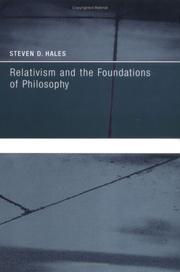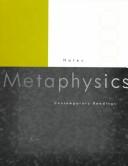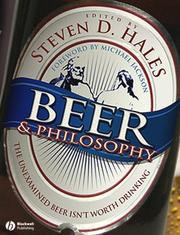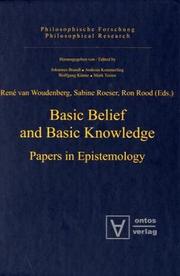| Listing 1 - 8 of 8 |
Sort by
|
Book
ISBN: 9781405190213 1405190213 Year: 2011 Volume: 74 Publisher: Malden, Mass. Wiley-Blackwell
Abstract | Keywords | Export | Availability | Bookmark
 Loading...
Loading...Choose an application
- Reference Manager
- EndNote
- RefWorks (Direct export to RefWorks)
"A Companion to Relativism presents original contributions from leading scholars that address the latest thinking on the role of relativism in the philosophy of language, epistemology, ethics, philosophy of science, logic, and metaphysics. Features original contributions from many of the leading figures working on various aspects of relativism Presents a substantial, broad range of current thinking about relativism Addresses relativism from many of the major subfields of philosophy, including philosophy of language, epistemology, ethics, philosophy of science, logic, and metaphysics"-- "Relativism is one of philosophy's oldest -- and most polarizing -- concepts. It has captivated thinkers since the days of Protagoras (who supported the notion) and Plato (who did not). Relativism is assailed by popes as leading people away from absolute religious truths, and blamed by social commentators for many of society's ills. With a few notable exceptions, 20th-century philosophers grew to dismiss relativism as an obviously mistaken or even self-refuting concept. But in the past decade, even its staunchest philosophical critics have come to realize that relativism is a legitimate option for explaining a variety of phenomena, including faultless disagreement, the utility of alternative logics, varieties of cross-cultural moralities, and differing ontological conceptual schemes. Reflecting this overdue reappraisal, A Companion to Relativism presents the latest thinking on the role of relativism in the philosophy of language, epistemology, ethics, philosophy of science, logic, and metaphysics. Original contributions to this volume feature cutting edge thinking from a variety of eminent scholars who approach relativism from various perspectives and philosophical subfields"--
Logic --- Philosophy of language --- Metaphysics --- General ethics --- Theory of knowledge --- Relativity --- Relativity. --- Philosophy --- Metaphysics. --- Relativism --- Knowledge, Theory of --- Reality --- Relationism

ISBN: 9780262083539 0262083531 Year: 2006 Publisher: Cambridge (Mass.) MIT press
Abstract | Keywords | Export | Availability | Bookmark
 Loading...
Loading...Choose an application
- Reference Manager
- EndNote
- RefWorks (Direct export to RefWorks)
Theory of knowledge --- Methodology --- Philosophy --- Relativity --- Relativism --- Knowledge, Theory of --- Reality --- Relationism --- Mental philosophy --- Humanities --- Research --- Humanities Methodology

ISBN: 9780534551452 0534551459 Year: 1999 Publisher: Belmont, CA : Wadsworth Pub. Co.,
Abstract | Keywords | Export | Availability | Bookmark
 Loading...
Loading...Choose an application
- Reference Manager
- EndNote
- RefWorks (Direct export to RefWorks)
Metaphysics --- Métaphysique --- God --- Ontology --- Philosophy --- Philosophy of mind --- Metaphysics. --- Métaphysique

ISBN: 0262274744 1282097210 9786612097218 1429409983 0262263130 9780262274746 0262083531 9780262083539 Year: 2006 Publisher: Cambridge, Mass. MIT Press
Abstract | Keywords | Export | Availability | Bookmark
 Loading...
Loading...Choose an application
- Reference Manager
- EndNote
- RefWorks (Direct export to RefWorks)
A defense of the view that philosophical propositions are true in some perspectives and false in others, arguing that the rationalist, intuition-driven method of acquiring basic beliefs favored by analytic philosophy is not epistemically superior to such alternate belief-acquiring methods as religious revelation and the ritual use of hallucinogens. The grand and sweeping claims of many relativists might seem to amount to the argument that everything is relative--except the thesis of relativism. In this book, Steven Hales defends relativism, but in a more circumscribed form that applies specifically to philosophical propositions. His claim is that philosophical propositions are relatively true--true in some perspectives and false in others. Hales defends this argument first by examining rational intuition as the method by which philosophers come to have the beliefs they do. Analytic rationalism, he claims, has a foundational reliance on rational intuition as a method of acquiring basic beliefs. He then argues that there are other methods that people use to gain beliefs about philosophical topics that are strikingly analogous to rational intuition and examines two of these: Christian revelation and the ritual use of hallucinogens. Hales argues that rational intuition is not epistemically superior to either of these alternative methods. There are only three possible outcomes: we have no philosophical knowledge (skepticism); there are no philosophical propositions (naturalism); or there are knowable philosophical propositions, but our knowledge of them is relative to doxastic perspective. Hales defends relativism against the charge that it is self-refuting and answers a variety of objections to this account of relativism. Finally, he examines the most sweeping objection to relativism: that philosophical propositions are not merely relatively true, because there are no philosophical propositions--all propositions are ultimately empirical, as the naturalists contend. Hales's somewhat disturbing conclusion--that intuition-driven philosophy does produce knowledge, but not absolute knowledge--is sure to inspire debate among philosophers.
Relativity. --- Philosophy. --- Methodology. --- Philosophy --- Mental philosophy --- Relativism --- Methodology --- Research --- Humanities --- Knowledge, Theory of --- Reality --- Relationism --- PHILOSOPHY/General --- Humanities Methodology
Book
ISBN: 9780470658826 9780470658833 9781118327807 Year: 2013 Publisher: Chichester Wiley-Blackwell
Abstract | Keywords | Export | Availability | Bookmark
 Loading...
Loading...Choose an application
- Reference Manager
- EndNote
- RefWorks (Direct export to RefWorks)
Philosophical anthropology --- Cognitive psychology --- Theory of knowledge --- General ethics --- Philosophy --- Propaedeutics of philosophy

ISBN: 9781405154307 Year: 2007 Publisher: Oxford Blackwell
Abstract | Keywords | Export | Availability | Bookmark
 Loading...
Loading...Choose an application
- Reference Manager
- EndNote
- RefWorks (Direct export to RefWorks)
Beer --- Philosophy


ISBN: 3110327511 9783110327519 9783937202709 3937202706 3110327279 9783110327274 3937202706 9783110327274 1299722407 Year: 2013 Volume: Bd. 4 Publisher: Berlin Boston
Abstract | Keywords | Export | Availability | Bookmark
 Loading...
Loading...Choose an application
- Reference Manager
- EndNote
- RefWorks (Direct export to RefWorks)
Over the last two decades foundationalism has been severely criticized. In response to this various alternatives to it have been advanced, notably coherentism. At the same time new versions of foundationalism were crafted, that were claimed to be immune to the earlier criticisms. This volume contains 12 papers in which various aspects of this dialectic are covered. A number of papers continue the trend to defend foundationalism, and foundationalism's commitment to basic beliefs and basic knowledge, against various attacks. Others aim to show that one important objection against coherentism, viz. that the notion of 'coherence' is too vague to be useful, can be countered.
Digital

ISBN: 9783110327519 9783110327274 Year: 2013 Publisher: Berlin ;; Boston De Gruyter
Abstract | Keywords | Export | Availability | Bookmark
 Loading...
Loading...Choose an application
- Reference Manager
- EndNote
- RefWorks (Direct export to RefWorks)
| Listing 1 - 8 of 8 |
Sort by
|

 Search
Search Feedback
Feedback About UniCat
About UniCat  Help
Help News
News